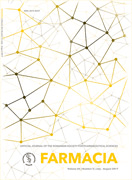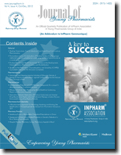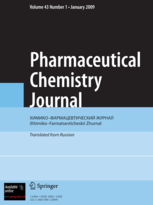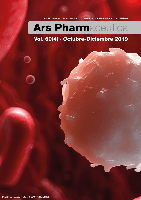
FARMACIA
Scope & Guideline
Championing Excellence in Pharmacology and Pharmaceutics.
Introduction
Aims and Scopes
- Pharmaceutical Research and Drug Development:
The journal emphasizes rigorous research related to the development, formulation, and optimization of pharmaceutical products, exploring various methodologies including in vitro and in vivo studies. - Natural Products and Phytochemistry:
There is a strong focus on the exploration of natural products, particularly plant-derived compounds, assessing their pharmacological properties, safety, and efficacy in various therapeutic contexts. - Clinical Pharmacology and Therapeutics:
FARMACIA publishes studies that investigate the clinical applications of drugs, including efficacy and safety assessments, medication adherence, and the role of pharmacists in patient care. - Pharmacovigilance and Drug Safety:
The journal covers topics related to the monitoring of drug effects, adverse reactions, and the importance of pharmacovigilance in ensuring patient safety. - Innovative Drug Delivery Systems:
Research on novel drug delivery mechanisms, including nanoparticles and other advanced formulations, is a recurring theme, aimed at improving therapeutic outcomes. - Interdisciplinary Approaches:
FARMACIA promotes interdisciplinary research that integrates various fields such as biochemistry, molecular biology, and clinical practices, addressing complex health issues.
Trending and Emerging
- Antimicrobial Resistance and Novel Antimicrobials:
In light of the global health crisis posed by antimicrobial resistance, research focused on novel antimicrobial agents and their mechanisms of action is gaining traction, highlighting the urgency for new therapeutic strategies. - Nanotechnology in Drug Delivery:
The application of nanotechnology in drug formulation and delivery systems is increasingly prominent, showcasing innovative methods to enhance drug efficacy and bioavailability. - Integrative Approaches to Health (One Health Concept):
Research integrating pharmacology with environmental and health sciences, particularly through the One Health framework, emphasizes holistic approaches to health solutions and disease prevention. - Phytopharmacology and Bioactive Compounds:
There is a rising interest in the pharmacological evaluation of phytochemicals, focusing on their therapeutic potential and mechanisms of action in treating various diseases. - Patient-Centered Pharmacotherapy:
Research emphasizing patient adherence, satisfaction, and the role of pharmacists in personalized medicine is becoming increasingly significant, reflecting a shift towards patient-centered care. - Digital Health and Pharmacovigilance:
The intersection of digital health technologies and pharmacovigilance is emerging as a critical area, especially in monitoring drug safety and effectiveness in real-world settings.
Declining or Waning
- Traditional Medicine and Folk Remedies:
Research focused on traditional medicine practices and folk remedies has decreased, possibly due to a growing emphasis on evidence-based approaches and clinical trials. - Basic Science without Direct Clinical Application:
Studies that are purely theoretical or basic science without immediate clinical implications appear less frequently, as the journal seeks to prioritize research with tangible therapeutic relevance. - General Reviews on Well-Established Drugs:
There is less emphasis on broad reviews of well-established drugs, as the journal pivots towards more novel compounds and emerging therapeutic strategies. - Epidemiological Studies without Pharmacological Focus:
Epidemiological research that does not directly connect to pharmacological interventions or drug efficacy is becoming less common, reflecting a trend towards more actionable research outcomes.
Similar Journals

Bangladesh Journal of Pharmacology
Transforming Insights into Pharmacological AdvancementsThe Bangladesh Journal of Pharmacology, published by the Bangladesh Pharmacological Society, is a leading platform dedicated to advancing knowledge in the field of pharmacology. With an ISSN of 1991-007X and an E-ISSN of 1991-0088, this open access journal has been making significant contributions to the field since its inception in 2006. Located at the Bangabandhu Sheikh Mujib Medical University in Dhaka, Bangladesh, the journal provides a vital resource for researchers, professionals, and students interested in pharmacology, toxicology, and pharmaceutics. As of 2023, the journal is categorized in the Q4 quartile for pharmacology, ranking 240th out of 313 in Scopus and falling within the 23rd percentile, reflecting its commitment to the dissemination of high-quality research. The journal encompasses a diverse array of topics from basic research to clinical applications, aiming to foster a deeper understanding of pharmacological principles and practices. By providing open access to its content, the Bangladesh Journal of Pharmacology ensures that valuable scientific findings are readily available to the global community, supporting the advancement of medical and pharmaceutical sciences.

Journal of Young Pharmacists
Inspiring Young Minds in PharmacologyJournal of Young Pharmacists is a distinguished peer-reviewed journal published by INPHARM ASSOCIATION in collaboration with PHCOG NET. With an ISSN of 0975-1483 and an E-ISSN of 0975-1505, this journal serves as a vital platform for disseminating pioneering research in the field of pharmacology and toxicology. Although coverage in Scopus was discontinued in 2018, the journal continues to be important in educating future pharmacists and advancing the discipline, evident from its ranking in the 29th percentile among general pharmacology journals. The Journal of Young Pharmacists seeks to bridge the gap between theoretical knowledge and practical application, encouraging young researchers, professionals, and students to contribute their insights and findings. The journal emphasizes innovative approaches and contemporary issues relevant to the pharmaceutical sciences, making it an invaluable resource for anyone involved in this dynamic field.

International Journal of Pharmaceutical Investigation
Pioneering Research for Effective Drug SolutionsInternational Journal of Pharmaceutical Investigation, published by INPHARM ASSOC, PHCOG NET, is a premier platform dedicated to advancing the field of pharmaceutical sciences. With the ISSN 2230-973X and E-ISSN 2230-9713, this journal serves as a vital resource for researchers, professionals, and students focused on drug development, formulation, and efficacy. By fostering a rich discourse on innovative pharmaceutical practices and research breakthroughs, the journal plays a critical role in enhancing global health outcomes through groundbreaking scholarly work. The absence of open access allows for selective dissemination of high-quality content, promoting rigorous peer-review processes that uphold academic integrity. Featuring articles that span a diverse range of topics within pharmaceutical sciences, the International Journal of Pharmaceutical Investigation is committed to supporting the ongoing evolution of this dynamic field, making it an essential read for anyone engaged in pharmaceutical research and development.

Advances in Pharmacology and Pharmacy
Exploring Innovations in Pharmaceutical ScienceAdvances in Pharmacology and Pharmacy is a pioneering journal devoted to the dissemination of cutting-edge research in the fields of pharmacology and pharmaceutical sciences. Published by Horizon Research Publishing, this peer-reviewed journal boasts a commitment to advancing knowledge and innovation, making it an essential resource for researchers, industry professionals, and students alike. With an ISSN of 2332-0036 and an E-ISSN of 2332-0044, it provides a platform for high-quality research articles that explore new therapeutic approaches, drug development strategies, and the regulatory aspects of pharmaceutical science. Although currently lacking a formal impact factor, the journal's emphasis on open access ensures that articles are widely available, promoting the sharing of valuable insights and collaborative efforts in the scientific community. Located at 506 N Garfield Ave, Ste 210, Alhambra, CA 91801, the journal welcomes contributions from diverse areas within pharmacology and pharmacy, reinforcing its significance as a vital resource in the ever-evolving landscape of pharmaceutical research.

PHARMACEUTICAL CHEMISTRY JOURNAL
Exploring New Frontiers in Pharmaceutical Chemistry.Pharmaceutical Chemistry Journal is a pivotal publication in the field of pharmaceutical sciences, renowned for its in-depth articles and research findings. Published by Springer in the United States, this journal provides a crucial platform for researchers, students, and professionals dedicated to advancing drug discovery and pharmacology. With an ISSN of 0091-150X and an E-ISSN of 1573-9031, this journal has consistently aimed to promote scholarly communication and innovation within its scope since its inception in 1967. Despite its current Category Quartiles ranking of Q4 in both Drug Discovery and Pharmacology, the journal remains a valuable resource for disseminating new ideas and findings that contribute to the scientific community. Researchers benefit from the journal's commitment to high-quality peer-reviewed content, even in an environment where open access options are currently not available. As the field evolves, the Pharmaceutical Chemistry Journal continues to play an important role in shaping future advancements in drug development and safety.

Indian Journal of Pharmaceutical Education and Research
Bridging local insights with global pharmaceutical advancements.Indian Journal of Pharmaceutical Education and Research, published by the Association of Pharmaceutical Teachers of India, is a pivotal platform for scholarly discussion in the field of pharmacology, toxicology, and pharmaceutics. ISSN 0019-5464, this esteemed journal aims to foster the exchange of innovative research, clinical advancements, and educational practices within the pharmaceutical sciences community. As a Q3-ranked journal in its category as of 2023, it reflects a commitment to upholding the standards of academic excellence and contributes significantly to the ongoing development of pharmaceutical education. The journal is a valuable resource for researchers, professionals, and students, with content spanning various key areas including drug formulation, safety, and the latest trends in pharmaceutical education. By providing open access to its research and reviews, the journal ensures that vital information is disseminated widely, promoting collaboration and learning among stakeholders in the pharmaceutical sector. Based in Bangalore, India, the journal has been instrumental in highlighting regional research while fostering a global dialogue in pharmaceutical sciences. As it continues its journey from 2008 to 2024, it remains dedicated to impacting the field through rigorous peer-reviewed content and engaging with contemporary challenges in healthcare and education.

Ars Pharmaceutica
Bridging the gap between science and society in pharmaceutical discourse.Ars Pharmaceutica is a distinguished open-access journal published by UNIV GRANADA, EDITORIAL, that has been at the forefront of pharmaceutical sciences since its establishment. With ISSN 0004-2927 and E-ISSN 2340-9894, this journal aims to disseminate high-quality research in pharmacology, toxicology, and pharmaceutics, contributing to the advancement of the field. With a historical scope that spans from 1980 to 2017, it has played a pivotal role in shaping the discourse surrounding pharmaceutical science and its intersection with the arts and humanities. Although currently ranked within the 13th percentile in Scopus for Pharmaceutical Science and the 11th percentile for History and Philosophy of Science, Ars Pharmaceutica continues to uphold its commitment to academic excellence and innovation. By providing a platform for open-access research, it encourages collaboration and knowledge sharing among researchers, professionals, and students, thus enhancing the broader understanding of pharmaceutical developments and their societal implications.

PHARMACIA
Unlocking the future of pharmacy through open-access research.PHARMACIA is a distinguished open-access journal, published by PENSOFT PUBLISHERS, that has been a pivotal platform for advancing the field of pharmaceutical sciences since 2007. This journal, with ISSN 0428-0296 and E-ISSN 2603-557X, is based in Bulgaria and continues to publish high-quality research and reviews relevant to pharmacy, pharmacology, and toxicology. Recognized in the Q3 category for Pharmaceutical Sciences and Pharmacology (medical), as well as Q2 in Pharmacy according to the latest rankings, PHARMACIA is celebrated for its commitment to fostering knowledge dissemination and innovation in drug development, therapeutic approaches, and pharmacological research. With a Scopus rank of #17 in Pharmacy and recognition in various health professions, the journal attracts contributions from researchers, professionals, and students seeking to impact the pharmaceutical landscape. Its convenient open-access format ensures that articles are readily available to a global audience, encouraging collaboration and advancement in the life sciences.

TROPICAL JOURNAL OF PHARMACEUTICAL RESEARCH
Exploring new frontiers in tropical pharmaceutical research.Tropical Journal of Pharmaceutical Research is an esteemed open-access platform dedicated to advancing the field of pharmaceutical sciences, published by the Pharmacotherapy Group in Nigeria. With an ISSN of 1596-5996 and open access established since 2002, this journal serves as a critical resource for researchers, professionals, and students seeking to disseminate and access high-quality research in both pharmaceutical science and pharmacology. Despite its ranking in the third quartile (Q3) for Pharmaceutical Science and the fourth quartile (Q4) in Pharmacology as of 2023, the journal continues to stand out with its commitment to fostering significant dialogue and innovation in the scientific community. Anchored at the University of Benin, Faculty of Pharmacy, the journal invites contributions that explore novel pharmaceutical research, clinical applications, and drug development, playing a vital role in addressing health challenges that are particularly relevant to tropical regions. Researchers can look forward to publishing their findings in a journal that not only promotes the sharing of knowledge but also enhances the scientific discourse within a rapidly evolving field.

CHEMICO-BIOLOGICAL INTERACTIONS
Advancing Understanding in Pharmacology and ToxicologyCHEMICO-BIOLOGICAL INTERACTIONS is a premier journal published by Elsevier Ireland Ltd, dedicated to advancing the field of chemical and biological interactions since its inception in 1969. With a robust focus on pharmacology and toxicology, the journal holds a prestigious Q1 ranking in both Medicine (miscellaneous) and Toxicology, reflecting its significance in disseminating influential research. As part of the Scopus database, it ranks #21 out of 133 journals in Toxicology, positioning it in the 84th percentile and ensuring high visibility for cutting-edge studies. This scholarly platform serves as a crucial resource for researchers, professionals, and students who seek reliable and innovative findings at the intersection of chemistry and biology. While currently not open access, CHEMICO-BIOLOGICAL INTERACTIONS provides a comprehensive collection of articles that contribute to the ongoing dialogue in toxin research and its implications on medicinal chemistry, thereby fostering advancements in public health and safety.